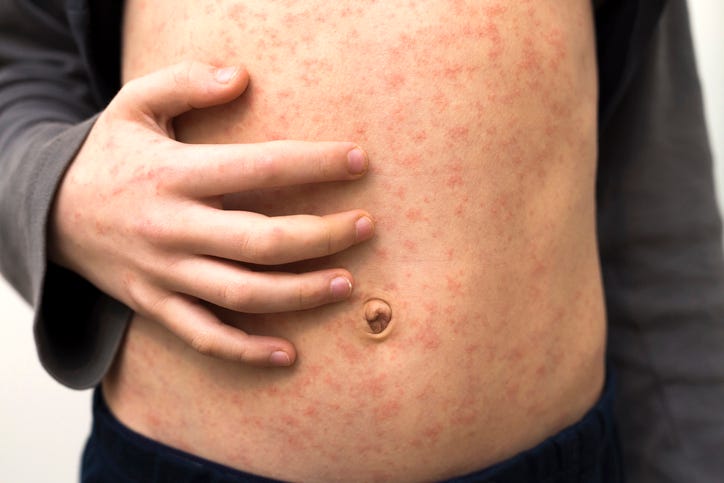
Cases of measles have been recorded in at least 16 states, including California, since the start of the year, and experts are worried the United States is on the cusp of another massive outbreak like we experienced in 2019.
According to the Centers for Disease Control and Prevention, at least 41 confirmed or suspected cases of measles have been reported since Feb. 29 across 15 other states: Arizona, Florida, Georgia, Indiana, Louisiana, Maryland, Michigan, Minnesota, Missouri, New Jersey, New York City, Ohio, Pennsylvania, Virginia and Washington.
The total is more than double the case count from two weeks ago, when the CDC reported 20 cases in 11 states on Feb. 15.
At this rate, health experts say the US will soon exceed 2023, when a total of 58 measles cases were reported nationwide. Many also fear we could see a repeat of 2019, the worst year for measles in the US in almost three decades.
"We're a little bit concerned we're now in the same or similar position to what we see epidemiologically in the run up to that 2019 year, where suddenly we had this explosion of cases. And that's what's troubling us," Natasha Crowcroft, a technical adviser for the World Health Organization, said during a meeting of federal vaccine advisers, per CBS News.
During the measles outbreak in 2019, 1,274 individual cases were confirmed in 31 states. It's the largest number of cases reported in the US since 1992.
"The majority of cases were among people who were not vaccinated against measles," the CDC said. "Measles is more likely to spread and cause outbreaks in US communities where groups of people are unvaccinated."
A spike in measles cases can also occur when there's an increase in the number of travelers who get measles abroad and bring it into the US, the CDC added.
Measles is among the most infectious diseases and spreads in the air when an infected person coughs or sneezes. It can remain infectious in the air and on surfaces for up to two hours. Symptoms include fever, cough, runny nose and a distinctive rash. It is most common in children under 5.
Symptoms of measles generally begin approximately eight to 14 days after exposure but can range up to 21 days. Transmission is possible four days before the rash becomes visible and four days after the rash appears.
Infection can lead to permanent physical damage such as deafness. Most deaths are due to complications like encephalitis, severe dehydration, serious breathing problems and pneumonia.
The World Health Organization and the U.S. Centers for Disease Control and Prevention said in November that measles deaths globally spiked by more than 40% last year, and cases rose after vaccination levels dramatically dropped during the COVID-19 pandemic.
In January, the CDC sent a warning to healthcare providers to be on the lookout for measles after being notified of 23 cases in the U.S., saying, "The increased number of measles importations seen in recent weeks is reflective of a rise in global measles cases and a growing global threat from the disease."
Want to get caught up on what's happening in SoCal every weekday afternoon? Click to follow The L.A. Local wherever you get podcasts.
All states require children to have certain routine vaccines to go to public school to prevent outbreaks of once-common childhood diseases like measles. However, all states also provide exemptions for children who have a medical reason for avoiding the shots, and most also offer waivers for religious beliefs.
In 2000, measles was declared eliminated from the United States. That means the disease is no longer constantly present in this country, according to the CDC. However, measles outbreaks continue to occur in countries around the world so there is always a risk of travelers bringing measles into the US, where it can spread and cause outbreaks among people who are not vaccinated. If a measles outbreak continues for a year or more, the US could lose its measles elimination status. Reestablishing elimination status would take time and resources, but the CDC says there wouldn't be any economic, political, or practical penalties, or adverse implications for the immunization program.
Follow KNX News 97.1 FM
Twitter | Facebook | Instagram | TikTok
